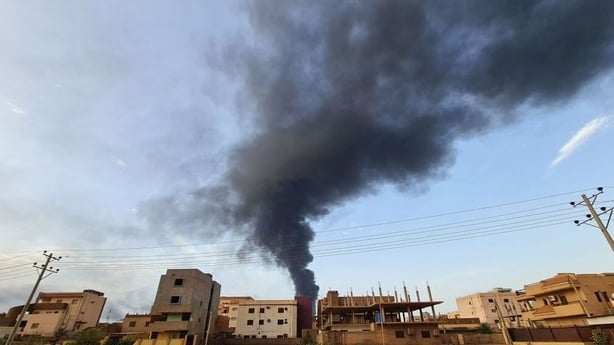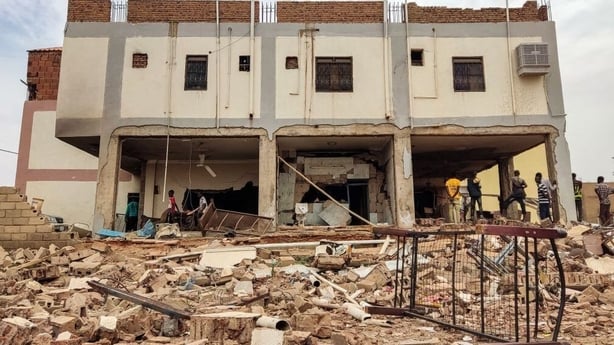About 300 children have been evacuated from an orphanage in Sudan's capital Khartoum where dozens of orphans were found last month to have died since fighting between rival military factions.
The International Committee of the Red Cross (ICRC), which facilitated the evacuation, said the children - aged between one and 15 - had been taken to a safer location in Wad Madani, about 200km southeast of Khartoum.
The ICRC said in its initial statement that 280 children and 70 caretakers had been moved, and an ICRC spokesperson said the number of children had risen to 300 by this morning.
This figure was confirmed by Siddig Frini, general manager at the Khartoum state Ministry of Social Development, which oversees care centres.
The evacuation offered "a ray of light in the midst of the ongoing conflict in Sudan", said Mandeep O'Brien, the representative in Sudan for the United Nations children's agency UNICEF.
On 29 May, it was reported that at least 50 children had died - dozens of them babies - at the state-run orphanage, known as Mygoma, since the start of the conflict in Khartoum on 15 April.
An orphanage official and doctor who works there said the deaths were mainly caused by malnourishment, dehydration and infections as most staff were kept away by the fighting.
Hadhreen, a volunteer group that has been helping at the orphanage, said it had confirmed the deaths of 71 children at the orphanage since the war started.
No official death toll has been issued.
The orphanage was home to about 400 young children before the conflict began.
Mr Frini declined to provide figures on the death toll.
"Many millions of children remain at risk across Sudan," UNICEF's Ms O'Brien said in a statement.
"Their lives and their futures are being endangered by this conflict every day."
Fighting rages at site of military facility in Sudan
Sudanese army soldiers and paramilitaries are fighting for control of a military facility in Khartoum as a fire rages at an oil and gas facility, according to witnesses.
The battles came a day after the powerful paramilitary Rapid Support Forces (RSF) announced in a statement they they taken "full control" of the Yarmouk weapons manufacturing and arms depot complex.
Witnesses speaking from southern Khartoum said they heard the "sound of gunfire and clashes" around the site, the most important military industrial facility in the country.
The RSF claimed that soldiers had fled the area, leaving behind large quantities of military equipment and vehicles.
The paramilitaries also posted videos online appearing to show their fighters inside the facility, celebrating.
Weapons, including machine guns, and large quantities of ammunition could be seen in the background.

Sudan has been embroiled in a deadly conflict since mid-April, when fighting erupted between army chief Abdel Fattah al-Burhan and his former deputy Mohamed Hamdan Daglo - commonly known as Hemeti - who commands the RSF.
Violence has spread across the country, most notably in the western region of Darfur, which is home to around a quarter of Sudan's population and has never recovered from a devastating two-decade war that left hundreds of thousands of people dead and more than two million displaced.
The fire at the Al-Shajara oil and gas facility near Yarmouk broke out overnight, witnesses said.
It is not clear what started the blaze but residents said they heard a loud explosion at the facility, around which fierce fighting has been under way for a number of days.
Plumes of smoke could be seen from as far as 10km away.

Since fighting broke out in Sudan on 15 April, more than 1,800 people have been killed, according to the Armed Conflict Location and Event Data Project.
Nearly two million people have been displaced by the conflict, according to the latest United Nations figures, including 476,000 who have sought refuge in neighbouring countries.
Talks mediated by Saudi Arabia and the United States broke down, and multiple ceasefires have failed to take hold.
Last week, Washington placed sanctions on the warring generals accusing both sides for the "appalling bloodshed" after the latest truce collapsed and the army pulled out of ceasefire talks altogether.
In October 2012, Sudan accused Israel of being behind a blast at the Yarmouk facility, leading to speculation that Iranian weapons were stored or manufactured there.
Israel at that time refused to comment on Sudan's accusation.

